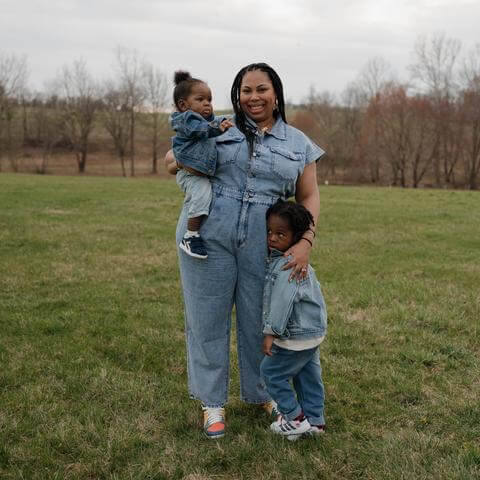My Story | My Black Maternal Health
by Imani Cabassa-George
Black Maternal Health Week is recognized each year from April 11-17 to bring attention and action to improving Black maternal health. During this year's campaign, I’ve been reflecting on my own personal Black maternal health story that led me to pursue my PhD at Howard.
I found out in February of 2020 that I was pregnant. Exactly three weeks later, the world was completely shut down because of the global COVID-19 pandemic. Navigating pregnancy already brings its challenges, but navigating it during a global pandemic - when you are forced to maintain social distance protocols from everyone who is usually a part of your community - definitely brought on a toll that I didn’t expect. My husband wasn’t able to attend a single prenatal visit with me; he always drove me to them, and then had to wait in the car to Facetime me for updates - like hearing the first heartbeat or seeing our baby through the sonogram. It was definitely a world that I couldn’t imagine being in, but we figured it out.
Concurrently, I was also finishing my Master’s in Public Health at the University of Maryland. I remember working on a group project, and the topic we chose was maternal health. Being pregnant, I immediately felt invested in the group project, hoping to take my own deep dive into all of the maternal health and public health resources out there. I recognized there is little research on the Black maternal health crisis, specifically within health communication which is essential for helping Black mothers make informed decisions during, pregnancy, childbirth and postpartum periods. I read the statistics and saw how public health experts defined the problem, but I still felt like there was an information gap. I read very few stories of pregnancy and birth complications, which made me nervous, knowing that I would soon be giving birth myself.
I went into labor on the morning of October 1, 2020. My morning started off normally, my husband and I went for a walk, and then I felt my water break. We rushed to the doctor, who let me know it was time to go to the hospital because my water broke, and I would need to be induced. I later found out that induction wasn’t necessary, but it was something providers offered when your water breaks. I missed breakfast that morning because of all the excitement, and I didn’t know that once I got to the hospital and was admitted, that I wouldn’t be allowed to eat. I spent the next 36 hours in labor with no food, a tremendous amount of pain, and scared to think of all the potential outcomes. After 36 hours of labor, I was told it was time for an emergency C-section. I remember crying to my husband, terrified because I had read all of the stories that ended horribly, and didn’t want that also to be my fate. My provider didn’t really take the time to explain things to me, but I do remember a nurse holding my shaking hand, and walking me through the whole procedure. That nurse stayed with me throughout the entire procedure until I was safely on the other side of it. Her kindness has always remained in my mind. My baby boy, Parker, safely arrived into the world at 6:30 PM on October 2nd, and we were both safe.
Since 2020, the Black maternal health crisis has received national attention. Several celebrities, and families of Black mothers who lost their lives, spoke up about the mistreatment of Black women in the prenatal/postpartum procedures. With my traumatic birth experience, I also decided that I wanted to continue my education, and decided to pursue my PhD at Howard in the Communication Culture and Media Studies Program, focusing on health communication.
Through my studies, I’ve seen more and more research being published about Black maternal mortality. However, two major gaps are still missing within this body of literature: research that centers on Black women (by Black women, from Black women, etc) and research about the local problem here in the DMV, specifically DC. Within the nation’s capital, the Black maternal health crisis doubles the national average of mothers who die during pregnancy or childbirth. The 2018 Health of Women and Children Report showed that the maternal mortality rate for Washington, DC was 36.1 deaths for every 100,000 births, and for Black women in the District, the maternal mortality rate was 70.1 deaths for every 100,000 births (United Health Foundation, 2018). Black birthing people made up, on average, about half of all births in DC while accounting for 90% of all pregnancy-related deaths. The primary location of most pregnancy-related deaths happened in Wards 7 and 8, which experienced around 70% of pregnancy-related deaths between 2014-2018 (DC Department of Health, 2018). When reflecting on these statistics, it is hard to ignore the maternal health crisis that is happening right in front of us in our own region.
Since coming to Howard, I have been deeply committed and passionate about health communication research that focuses on Black maternal health. I recognize the need for the Black maternal health crisis to be studied through a lens that compliments public health research, which is communications. I hope that in my particular research, I am able to help the community of Black mothers that I am a part of. While also asking difficult questions, I continue to research potential solutions that keep our communities engaged and protected. This Black Maternal Health Week, I am reminded of all of the community resources that help to provide safety and education around pregnancy and childbirth. As I work to complete my degree, I hope that I can continue to investigate the Black maternal health crisis, centering the experiences of Black mothers in hopes for safer outcomes during pregnancy, childbirth, and postpartum periods.
Anyone interested in learning more can check out these organizations and resources:

